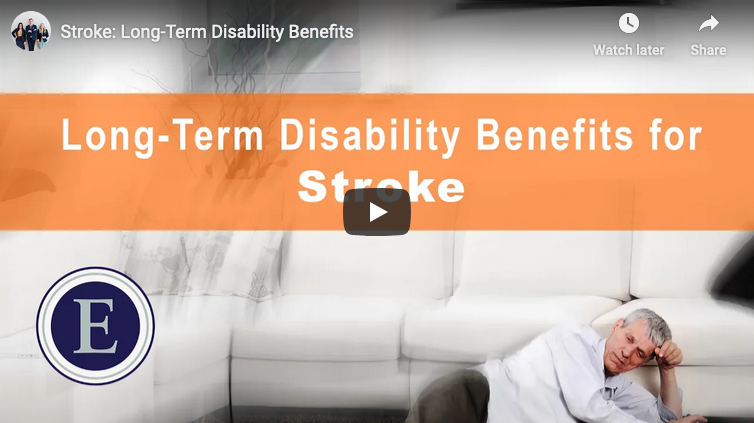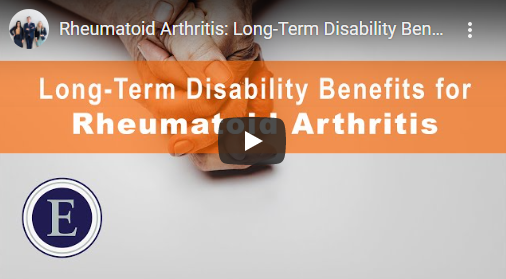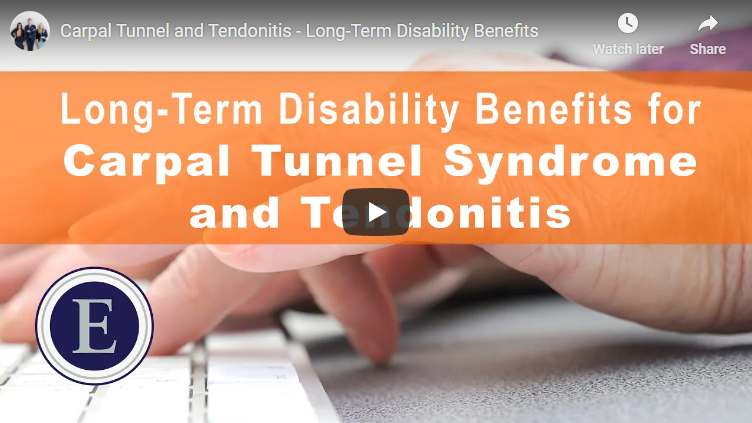Do I Qualify for Long-Term Disability Benefits if I Have Post-Traumatic Stress Disorder?
Can I Get Long-Term Disability Benefits for Post-Traumatic Stress Disorder?
One of the most common questions we get is “Do I qualify for long-term disability benefits if I have Post-Traumatic Stress Disorder?”
Post-traumatic Stress Disorder (PTSD) is an anxiety disorder that develops in response to a traumatic event and it can have a significant impact on a person’s employment and daily life.
Therefore, Post-Traumatic Stress Disorder can qualify for long-term disability benefits – provided it is not excluded by your insurance policy wording.
LTD Denied? Which Category Do You Fit In?
Category 1: The insurance company denied your initial claim for disability benefits for Post-Traumatic Stress Disorder.
Category 2: The insurance company denied your appeal.
Category 3: The insurance company discontinued or terminated your benefits.
What Can We Do For You?
We’ll work with you and your physician to help challenge the insurance company’s denial or discontinuance of your long-term disability benefits.
Where necessary, we will engage other trusted professionals to support your case including specialists, functional capacity evaluators, and vocational evaluators to help credibly explain why your disability symptoms are preventing you from doing your “own occupation” or “any occupation”.
Our Help Can Make All The Difference. How?
- Over 25 years’ combined experience getting our clients the benefits they deserve.
- Expertise in both disability and employment law (your employment status is directly linked with your disability)
- We offer a free case assessment
- We offer flexible rates, including contingency fees (i.e., only pay if you win)
- Service across all of Ontario
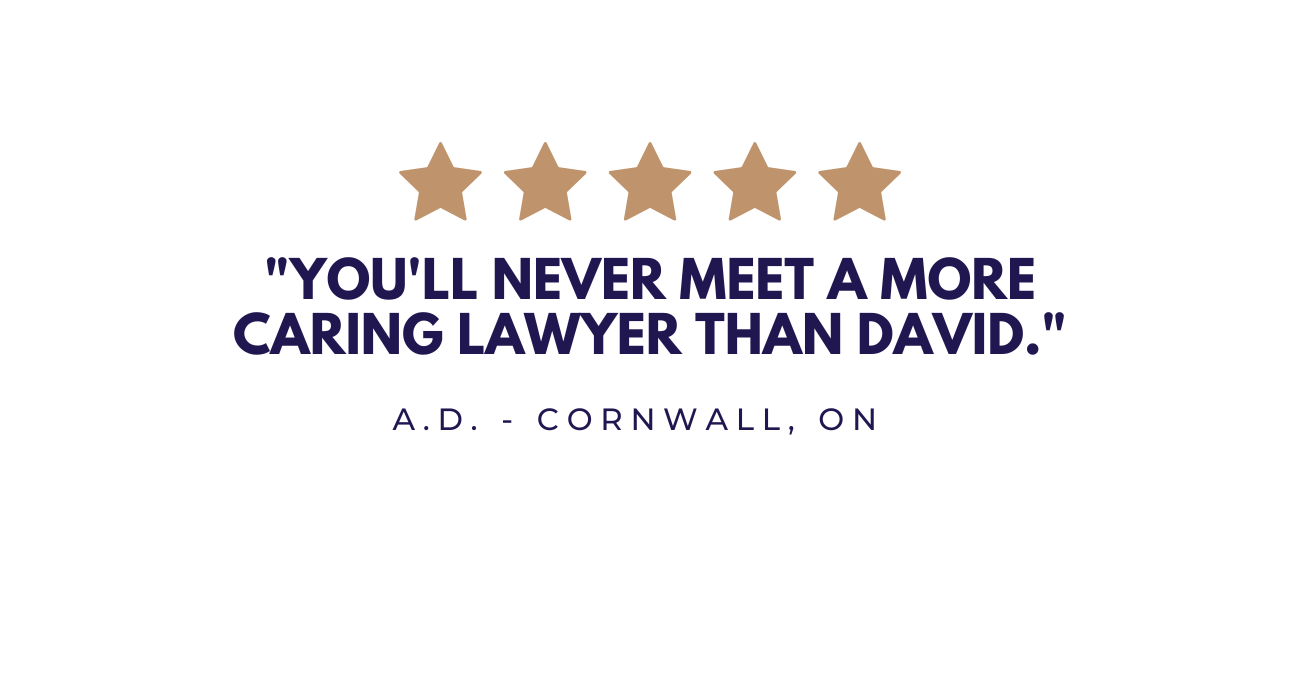

Post-Traumatic Stress Disorder: Overview
PTSD is the result of experiencing a traumatic event such as sexual assault or a serious accident. Previously referred to as “shell shock” and “combat fatigue”, those diagnosed with post-traumatic stress disorder are subject to intense thoughts and feelings such as sadness, anger and/or fear. PTSD can be caused by both direct and indirect exposure to trauma (i.e. death of a close family member).
The different subtypes of PTSD include:
Uncomplicated PTSD – People with uncomplicated PTSD do not experience symptoms of any other mental illness/disorder. It is the most common form of PTSD and usually has a positive response to treatment.
Complex PTSD – Complex PTSD is the result of cumulative trauma throughout one’s childhood or adulthood. This includes exposure to things like repeated physical, sexual or emotional abuse, growing up in an unstable or unsafe environment, or living in an area affected by war. Treatment for complex PTSD usually takes a longer time than for uncomplicated PTSD.
Co-morbid PTSD – Those diagnosed with co-morbid PTSD experience at least one co-occurring mental health condition in addition to symptoms of PTSD.
Dissociative PTSD – Dissociative symptoms of PTSD (i.e., dissociative amnesia, dissociative flashbacks) are more prominent in this subtype.
Someone diagnosed with Co-morbid PTSD may have other mental disorders or illnesses such as:
- Major Depressive Disorder
- Anxiety Disorder
- Panic Disorder
- Substance Use Disorder
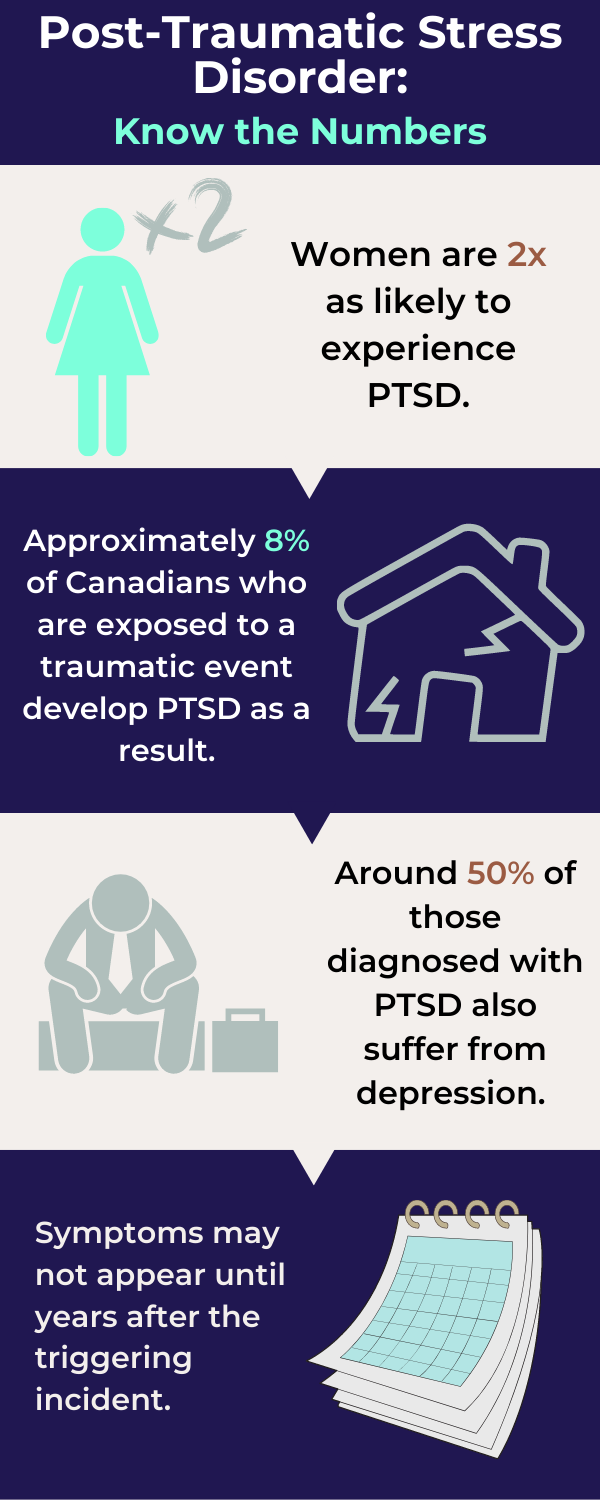
Most Common Symptoms of Post-Traumatic Stress Disorder
Symptoms of PTSD fall into 4 categories. People who experience a traumatic event are likely to share the following symptoms for a short period of time immediately after, however a diagnosis of PTSD cannot be made unless the symptoms persist for over a month and interfere with everyday tasks.
Intrusion:
- Recurrent, unwanted memories of the triggering event(s).
- Flashbacks of the event(s).
- Intense emotional/physical reaction to something that reminds you about the event(s).
Avoidance:
- Avoiding triggers (i.e., places, people, objects).
- Resisting discussion about the event(s) or how it makes you feel.
Reactivity/Arousal Symptoms:
- Irritability
- Outbursts of anger
- Difficulty sleeping
- Being easily startled
- Decreased concentration
Cognition and Mood Symptoms:
- Loss of interest in previously enjoyed activities
- Overwhelming feelings of guilt or blame
- Negative thoughts about oneself or other people
- Feeling of detachment
Criteria for a Diagnosis of Post-Traumatic Stress Disorder
PTSD can be difficult to diagnose for several reasons: patients may not recognize the link between their symptoms and a traumatic experience; patients may refuse to disclose the triggering event or withhold important information; or patients may have co-existing mental health conditions with similar symptoms to PTSD.
PTSD is usually diagnosed with a full physical exam to rule out any other medical explanations for your symptoms, followed by a psychological evaluation discussing symptoms and the presumed triggering event.
For the reasons stated above, long-term disability insurers often deny claims for post-traumatic stress disorder.
Treatment for Post-Traumatic Stress Disorder
Medication
PTSD is commonly treated with antidepressants (e.g., Sertraline, Paroxetine). Antidepressants are prescribed with the intent of controlling symptoms of sadness, anger, and anxiety. Medication targeting sleep issues and/or nightmares may be prescribed as well.
Psychotherapy
PTSD is often treated with psychotherapy. Various forms of “talk therapy” are suggested to patients depending on their individual needs.
Cognitive Restructuring – A collaborative effort between a therapist and patient to determine the details of the event and to redirect feelings of blame from oneself.
Exposure Therapy – An approach focusing on facing past trauma in a safe and protective environment. This includes recounting details of the event through writing or returning to the place of the incident.

Post-Traumatic Stress Disorder & Your Employment
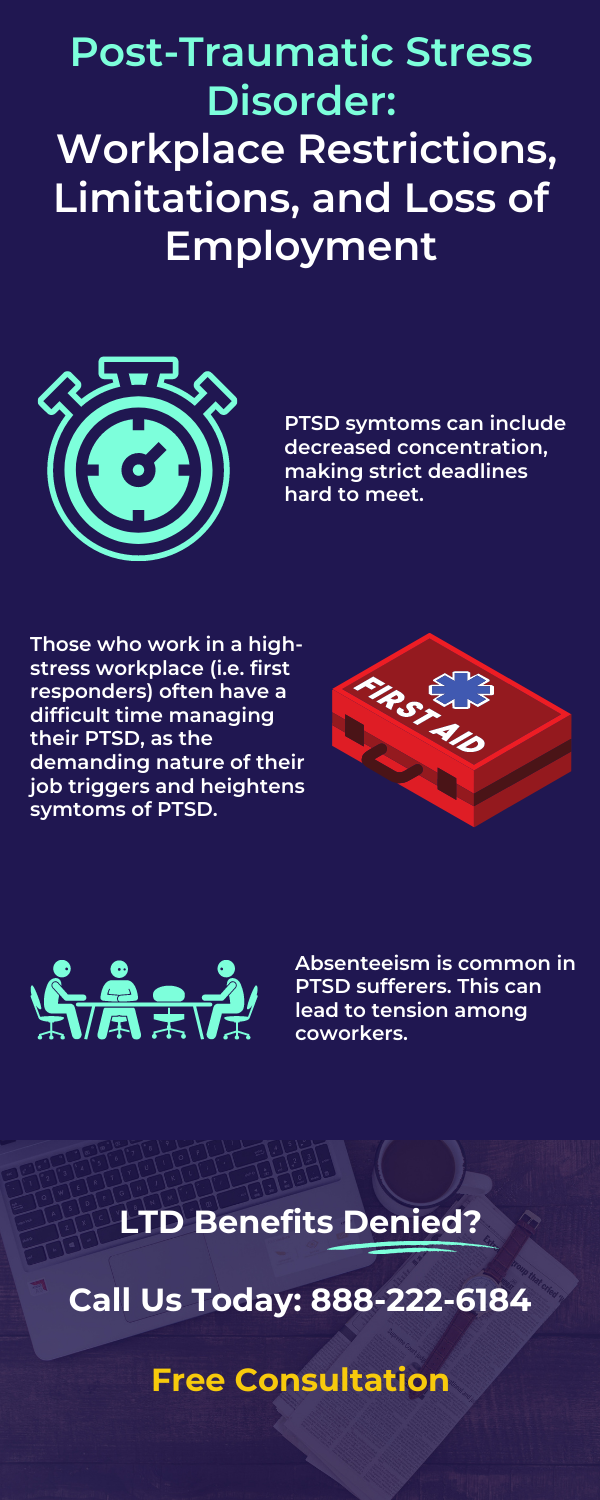
Workplace Restrictions Caused by Post-Traumatic Stress Disorder
When considering your employment and Post-Traumatic Stress Disorder diagnosis, consider how stable your condition is, how safe you are to do your job and what the demands are physically and mentally.
Post-Traumatic Stress Disorder and Workplace Discrimination
It is unlawful to discriminate against someone in the area of employment based on their physical disability: Ontario’s Human Rights Code and the Canadian Human Rights Act.
If you are suffering from Post-Traumatic Stress Disorder, you might face discrimination in a variety of ways:
- You experience employment termination because you have PTSD.
- You are denied accommodation because of your PTSD.
- After returning from a disability leave, your employer places you in a lower, part-time position at a lower rate of pay.
- Someone makes unwelcome remarks or jokes about your disability.
- Someone offends or humiliates you physically or verbally threatens or intimidates you because of your disability.
- Retaliating against you for filing a human rights complaint.
Ertl Lawyers are experts in Employment and Disability Law. If you have been discriminated against, our disability and employment lawyers in Toronto can help, including:
- Having your employer comply with their duty to accommodate you.
- Having your employer stop all forms of discriminatory conduct.
- Representing you in wrongful dismissal in Ontario, constructive dismissal, and human rights matters.
- Ensuring that your employer complies with its statutory obligations, including its obligations under the Employment Standards Act.
- Negotiation severance packages (including continuation of benefits).

Post-Traumatic Stress Disorder & Insurance Companies
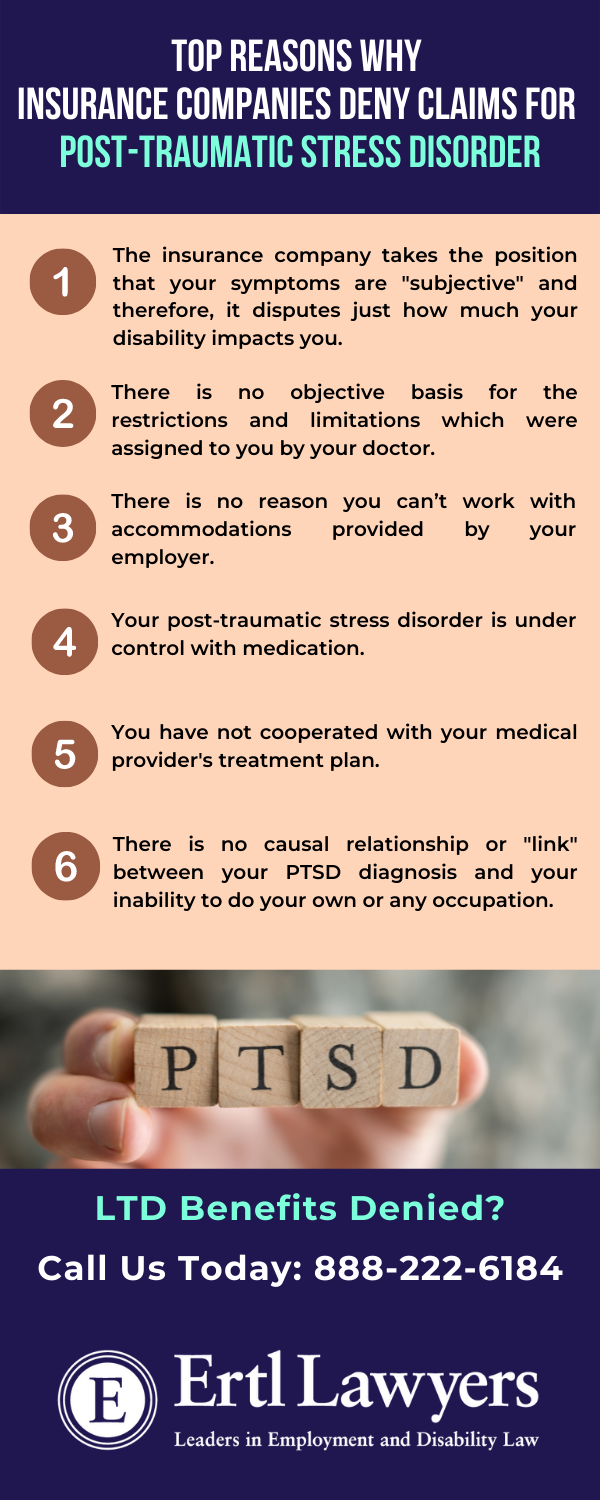
Apply for Long-Term Disability Benefits for Post-Traumatic Stress Disorder ?
Review Your Policy Carefully
Your entitlement to long-term disability benefits for post-traumatic stress disorder depends on the specific wording of your disability policy.
Therefore, you will need to review your policy and see how it defines things like “totally disabled” and “occupation” – and whether any exclusions apply (particularly for pre-existing conditions).
Gather Medical Evidence
To be entitled to long-term disability benefits for PTSD every insurer requires you to provide medical evidence documenting how your illness or injury causes restrictions or lack of ability, such that you are prevented from performing the essential duties of your occupation.
Therefore, you will need a copy of your medical records to see if there is an objective basis for your diagnosis of post-traumatic stress disorder and what your medical records say about your symptoms and your restrictions and limitations.
Gather Evidence of Workplace Limitations
Because your entitlement to long-term disability benefits for PTSD depends on the strength of your evidence, you should get a copy of your employee file from work. It may show your PTSD negatively impacted your work performance. Your work performance may have been affected by frequent absences from work, stress, etc.
Create a List of the Physical Duties of Your Job
You should get a copy of your job description. Based on that job description, you should write out a detailed list of the physical (and mental) duties associated with your job description – and explain how your post-traumatic stress disorder limits or prevents you from performing your own occupation.
Ask Your doctor for a Report
It is recommended that you provide your doctor with your occupational description. You should ask your doctor to prepare a report that clearly explains the objective basis for:
- Your diagnosis of post-traumatic stress disorder
- Your restrictions and limitations
- Reasons why you are unable to perform some or all of the essential duties of your own occupation.
Follow Your Doctor’s treatment Plan
Your entitlement to long-term disability benefits also requires you to be receiving regular, ongoing care and treatment for your PTSD. In other words, don’t skip appointments, and always follow your doctor’s treatment plans.
Keep a Diary
On your end, it is important to keep a diary tracking your symptoms, and whether your treatment is helping.
What Other Benefits Might I Be Entitled to for Post-Traumatic Stress Disorder?
Other than short-term and long-term disability benefits through a group or individual insurance plan, people suffering from PTSD might be entitled to one or more of the following benefits:
- Employment Insurance (EI) Sickness Benefits;
- Ontario Disability Support Plan (ODSP);
- Disability Tax Credit (DTC);
- Disability Creditor Insurance (under your mortgage or credit cards);
- Trillium (extended health benefits);
- Canada Pension Plan Disability (CPP-D); and
- Disability Pension (employer).
Organizations / Associations / Colleges
- PTSD Association of Canada
- International Society for Traumatic Stress Studies
- Anxiety and Depression Association of America (ADAA)
Disclaimer: The content on this web site is provided for general information purposes only and does not constitute legal, medical, or other professional advice or an opinion of any kind. Users of this web site are advised to seek specific legal advice by contacting members of Ertl Lawyers (or their own legal counsel) regarding any specific legal issues. Ertl Lawyers does not warrant or guarantee the quality, accuracy or completeness of any information on this web site
Sources:
https://cpa.ca/sections/traumaticstress/simplefacts/
https://psychiatry.org/patients-families/ptsd/what-is-ptsd
Long-Term Disability Benefits Denied?
Ertl Lawyers provides expert representation in long-term disability matters.
The vast majority of disability matters are resolved through negotiation and mediation – and that’s because insurance companies know that we are passionate about our clients’ rights.
How we can help you:
• free disability policy analysis
• free case assessment
• applying for disability benefits
• appealing a denial or termination of your benefits
• disputing a denial through a legal claim
• handling all communications with your employer
• protecting your employment
• prosecuting human rights claims
Fair, Flexible Rates – Including Contingency Fees
(Don’t Pay Unless You Win)
Our Help Can Make All The Difference.
Related Blogs
The Most Common Types of Disabling Conditions and How to Deal with Them
The latest numbers from the World Health Organization (WHO) show that over 1 billion people around the world live with a disabling condition. The current world population is approximately 7.8 billion and is expected to reach 8 million this month. In other words, more...
What is the Accessible Canada Act and Who Does it Benefit?
On June 20, 2018, the Government of Canada introduced Bill C-81 in Parliament, an Act intended to create a barrier-free Canada by 2040, known as the Accessible Canada Act. The Accessible Canada Act (ACA) received Royal Assent on June 21, 2019, and became law on July...
What to Expect When Returning to Work After Disability Leave
If you've been away from work for a significant amount of time while you were on long-term disability (LTD) leave, you may understandably feel anxious and unsure of what to expect if you're returning to work. In this post, you'll learn about how a return-to-work plan...




